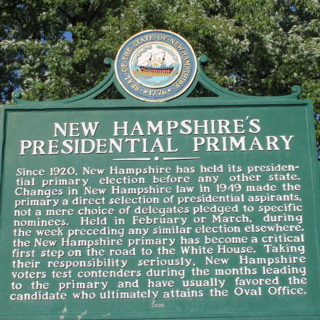Heuristics
The Psychology of the Democratic Primaries
What do momentum, electability, and heuristics mean for the primary season?
Posted February 10, 2020 Reviewed by Matt Huston

The Democratic presidential race has begun but is far from over. What are the psychological effects that influence the comparative prospects of Joe Biden, Pete Buttigieg, Bernie Sanders, and Elizabeth Warren?
Momentum, the Social Proof of Elections
The Iowa Caucuses claim to represent the preferences of a small state with little ethnic diversity. Yet the results seem to have outsized influence on the nomination. The state has predicted the eventual Democratic nominee in the last four contests (Clinton in 2016, Obama in 2008, Kerry in 2004, and Gore in 2000). This effect is often called momentum, or the increased likelihood of a candidate attracting support after placing well in early state races. Many political scientists have chalked up “the Big Mo”—as George H. W. Bush called it in 1980 (he lost to Reagan)—to the greater media attention and campaign donations that come after a victory.
The psychological basis is more likely social proof—the human tendency to rely on the judgment of others. This effect is more powerful when we are uncertain (is Mayor Pete really electable?) and when the social group shares our identity (they are “my people”). In this case the Iowa caucuses reflect the beliefs of fellow Democrats, who have an assumed trustworthiness as members of the same team.
In the contemporary political environment of dueling fact perceptions, individuals often deny or downplay what they do not want to see. But the public endorsement of those realities/perceptions by others can jolt us into recognition. Social proof plays a powerful role because in the current media environment it is easy to avoid seeing or reading about the facts we want to avoid recognizing. A large social proof event like a state electoral result is harder to avoid and dismiss.
The current beneficiary of momentum and social proof is Pete Buttigieg. His unexpected strength in Iowa signals that others believe he is electable. The reverse is the case for Biden. The recognition of his weakness in Iowa may have opened the gates for his supporters to recognize possible flaws and potentially change their mind about his core appeal as the most electable Democrat.
However, this year’s Iowa effect may be blunted by the chaos in the counting. The unclarity and lateness of the results may have allowed many voters to deny their significance. Unlike other years, a disreputable Iowa caucus may have reduced the momentum and lowered the offered proof.
The Power of the Negative
One of the core psychologies of candidate support is that the negative is more powerful than the positive. Voting against a candidate is more clear and persuasive than voting for a candidate. It may be difficult to know what you like (which requires knowledge and comparisons). It is far easier to know what you hate (which is emotional and visceral). As Monty Burns famously said, “I know what I hate, and I don’t hate this.” The political power of negative thinking has been ratcheted up by the rise of negative partisanship, or the greater motivation to keep the opposing party out of office rather than to see your own party victorious.
Electability
A candidate’s electability—the subjective assessment that she is likely to win in the November election—may or may not be more important to an individual voter than whether a candidate represents their true preferences. Would a Democratic voter rather have a nominee who was closer to their beliefs but less likely to win, or one more likely to prevail but further away from their preferences? It may depend on how bad the alternative is. The current environment of negative partisanship and visceral opposition to Trump increases the likely importance of perceived electability.
Biden’s core appeal is in the perception that he would be the most electable, specifically because he appeals to blue-collar Democrats in the rust-belt states that are crucial to the 2020 outcome (Michigan, Pennsylvania, and Wisconsin). However, this perception may be fading as Biden’s age and propensity to make odd statements becomes more apparent. (See his recent reference to a young woman as a “dog-faced pony soldier” and his earlier challenge to a push-up contest).
Will his competitors have more ability to turn out voters where it counts? Will a socialist candidate fly in Pennsylvania? Will a young gay candidate appeal to older union members in Michigan? Will a female law professor resonate in Wisconsin?

The reason all of these effects are crucial in the primary context is the dominance of heuristics, or rules of thumb grounded in small pieces of information. The most deeply demonstrated and influential observation about elections is the low degree of information held by voters. It is easy for highly informed citizens who pay attention to campaigns to assume that other voters are similar to themselves, but that is very much not the case. Low information is the rule, with snippets of information getting through. Under these conditions, heuristic decision-making dominates.
Perhaps the strongest available heuristic is partisanship (knowing nothing else about a candidate, we prefer the one from our party). But the primary campaign, of course, eliminates this cue.
Another powerful heuristic is known as a social triangle or likeability heuristic: if I don’t know much about Candidate A, but I do know I like Person B, who likes Candidate A, I can be confident A is okay. The same logic applies to friends of friends or being set up on a date; if a person you trust thinks someone is solid, it is a decent bet. (It also works in reverse: if someone you dislike is friendly with an unknown person, it may be a good bet you wouldn’t like them either.)
The triangle explains the importance of endorsements. Bernie Sanders made a point of featuring Alexandria Ocasio-Cortez in his campaign ads; she is not identified, but just shown running up to high-five him. If you know and like Ocasio-Cortez, you may well like Bernie’s politics. If you don’t know who she is, she appears to be a young Hispanic woman who likes Bernie, which is another signal about him.
Sanders also has Ilhan Omar, Rashida Tlaib, Noam Chomsky, Cornel West, Danny DeVito, Jack Nicholson, Ariana Grande, and Michael Moore.
Biden has Michelle Kwan (the figure skater), Tom Hanks, Alec Baldwin, a number of unions, and Carol Moseley Braun (the first female African-American U.S. Senator).
Buttigieg has Robert DeNiro, George Takei, Jennifer Aniston, Keven Costner, Michael J. Fox, and Mandy Moore.
Warren has Julian Castro, Robert Reich, Megan Rapinoe, John Legend, Ashley Judd, Melissa Ethridge, Scarlett Johansson, the American Federation of Teachers, and The New York Times (split with Amy Klobuchar).
Another powerful low-information guide is known as the have-a-beer heuristic. Is the candidate someone you would want to have a drink and socialize with? In other words, do they seem approachable, likeable, or like you? George W. Bush was disliked by many politically, but is also perceived by many to be quite human and likeable (even by Ellen).
Related to the have-a-beer heuristic is the accepted shorthand for each candidate. Ask yourself which name is in your head for the candidates. I suspect it is Biden, Pete, Bernie, and Warren. Mayor Pete and Bernie get a first name, but I rarely hear people use Joe and especially not Elizabeth. Regardless of her other virtues, Senator Warren is not a casual individual. We haven’t said much about Amy Klobuchar, the fifth candidate, but she has been trying to promote the “Amy for America” brand, yet everyone I know refers to her as Klobuchar, and in the same sentence they will say Bernie or Pete.
Identity
Perhaps the strongest heuristic is the collection of characteristics described as identity. Does someone seem like me? Are they in my group, one of my people? Do they share my identity? This is often reduced to shared demographic characteristics—gender, race, religion, region, sexuality, education, etc.—but that can be a mistake.
Identity is more accurately the characteristic that individuals feel describes them best in the political context. For example, not all women think of their female aspect of their being as their dominant identity; the same applies to Hispanics or union members. Identity is not merely that someone fits a demographic category, but that they think politically with that characteristic in mind. Identity is not being X while voting, but voting as an X.
Identity heuristics can also work powerfully in a negative direction: Is this person unlike me in a way that makes me dislike them?
The four lead candidates offer very different identity markers in both positive and negative directions. Warren obviously stands out as a woman. The fight over whether Sanders really told Warren that a woman could not win the election (Warren says he said it; Sanders claims he did not) may reflect an appeal to women to vote grounded in that identity. Did this event make women voters feel disrespected by Bernie? Sanders’ rising fortunes and Warren’s fade in the polls suggest not.
Perhaps Buttigieg offers the most complex set of identity markers and potential effects as the young and openly gay candidate. Will many voters react negatively, as one famously did in Iowa? Will the blue collar voters whom Democrats are trying to lure back from Trump identify with Buttigieg? He also offers clear characteristics that are favored by blue collar voters, especially military service and religiosity. Will these positive markers overcome the possibly disfavored ones? The direction of each of these independent effects is relatively clear, but predicting the impact of two different ones that lean in opposite directions is deeply difficult.
Risk
A final aspect of primary psychology worth describing is people's disposition toward risk. A core psychological observation in prospect theory is that losses loom larger than gains. For most people most of the time, experimental findings suggest, losing $100 is associated with a negative feeling that is stronger than the positive feeling related to gaining $100. For this reason, we are not only motivated to avoid losses, but we are more likely to take risks when we perceive ourselves to be behind the eight-ball in order to regain our former status. In this sense the framing is all: when we feel we are in the realm of losses we act differently than when we feel we are in the realm of gains.
In the last few years of the Trump administration, Democrats generally feel they have suffered setbacks and are under threat. Living in this realm of losses may well make them less risk-averse in their choice of candidate. That could advantage Buttigieg as a risky up-and-comer. It may also aid Sanders and Warren. Biden’s apparent safety could have less appeal.
As the New Hampshire vote begins, these primary psychologies of social proof, negative partisanship, perceived electability, heuristics, identity, and risk will likely all play a role in a complex Democratic calculus.




